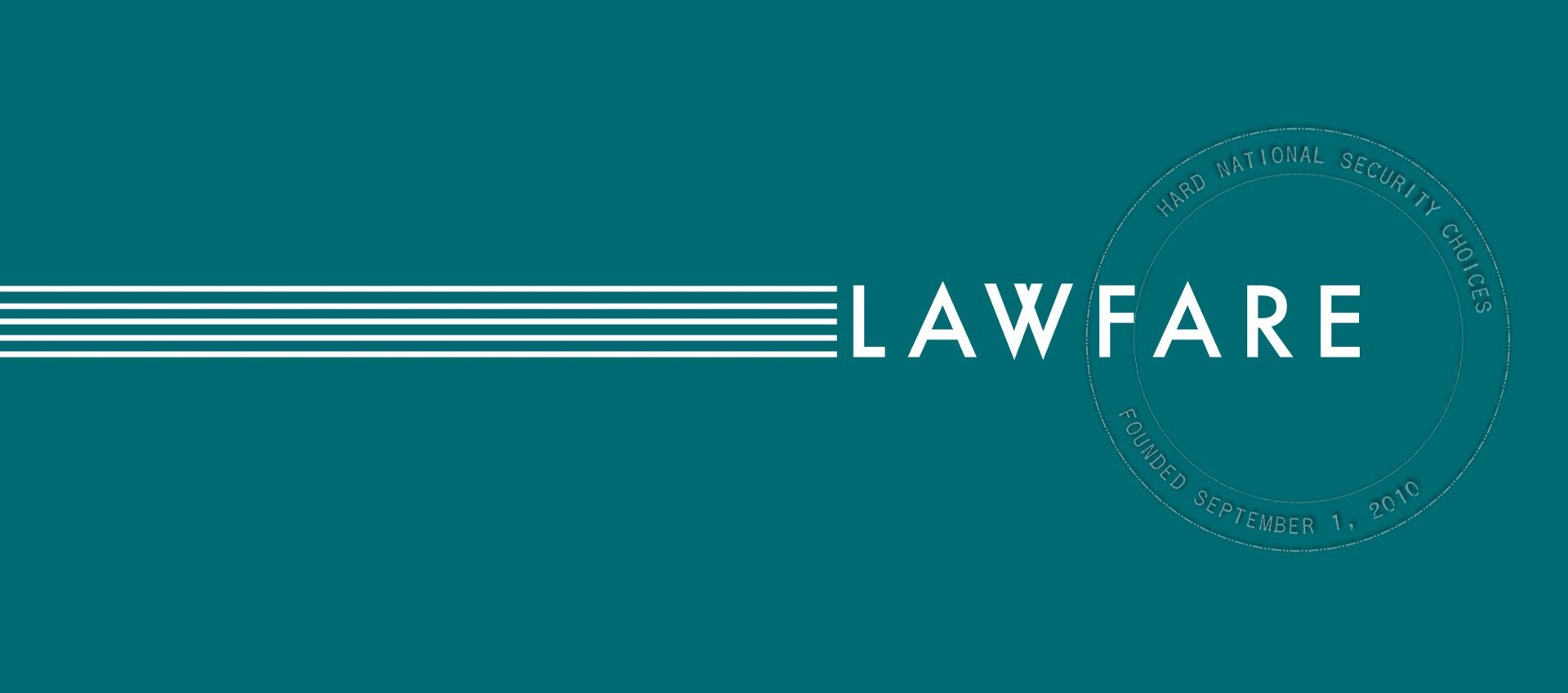Dealing with Trump: How Canada Has Been Successful (So Far)
Editor’s Note: Perhaps no country is closer to the United States—geographically and culturally—than Canada. Aside from a few unpleasant moments at the birth of the American republic, relations have been warm and mutually supportive. So it is no surprise that Canada watched the election of President Trump, with his insurgent rhetoric and calls for dramatic changes in U.S. policies, with concern.
Published by The Lawfare Institute
in Cooperation With

Editor’s Note: Perhaps no country is closer to the United States—geographically and culturally—than Canada. Aside from a few unpleasant moments at the birth of the American republic, relations have been warm and mutually supportive. So it is no surprise that Canada watched the election of President Trump, with his insurgent rhetoric and calls for dramatic changes in U.S. policies, with concern. Thomas Juneau of the University of Ottawa, who has long been the Foreign Policy Essay's Great White North correspondent, argues that so far Canadian leaders have done a masterful job forging good relations with the new administration and otherwise successfully preserving a close relationship.
***
Few countries have more to lose economically from a hostile Donald Trump administration than Canada. The country’s prosperity is largely dependent on privileged access to the U.S. market: About 75 percent of Canadian exports are sold in the United States, representing one-third of Canada’s GDP and providing for one-fifth of Canadian jobs. Canada’s most essential economic interest is, therefore, to avoid being targeted with protectionist measures by its southern neighbor.
In practice, candidate and President Trump’s ire has been mostly targeted at others, especially China and Mexico. Still, the Trump presidency poses daunting challenges for Canada: It has much to lose and little to gain. The best Canada can hope for is the continuation of the status quo, which has benefitted its prosperity and security tremendously. At worst, Canada could suffer devastating economic damage should trade become significantly hampered.
The government of Canada has performed very well in managing this unusual political situation. Most obviously, Trump’s rhetoric has largely spared Canada so far. Another positive indicator for Canada was Liberal Prime Minister Justin Trudeau’s productive visit to Washington in February: Discussions were friendly without the iciness that marked other high-profile visits, such as that of German Chancellor Angela Merkel. Trump has also ignored that oldest of irritants, defense spending. He has criticized European allies and partners such as Japan and Saudi Arabia, but not Canada—despite the fact that Canada does not even spend 1 percent of GDP on defense, an issue which has bothered successive U.S. administrations.
Canada has a recipe for dealing with Trump.
Trump did have an outburst on Canada’s “disgraceful” trade practices in April, singling out the dairy and softwood lumber sectors, but this has not been consequential so far. Softwood is the subject of an old dispute that has tainted bilateral ties since the days of Ronald Reagan, and would have likely picked up in a Clinton presidency as well. The Canadian media seized on the dairy issue with some anxiety given the intensity of agricultural politics in the country, but Canada actually has a trade deficit with the United States in this sector, and the numbers are very small: Canadian dairy exports to the U.S. market barely total $100 million, while imports reach $630 million.
Canada has a recipe for dealing with Trump. The central pillar has been a highly-organized centrally-planned strategy coordinated by a newly-established “war room” in the Prime Minister’s office. The highest levels of the government, on the political and on the non-partisan civil service sides, have all been mobilized. The message is clear: The United States needs to trade with Canada; hampering this would hurt the U.S. economy. Underlying this campaign has been Canada’s deep knowledge of U.S. political institutions and culture and its extensive networks in the country’s government, business, and civil society.
The charm offensive has been led by Prime Minister Trudeau. His visit to the White House in February 2017 was, even according to the U.S. media, a success. The visit was planned down to the last detail and showcased Canadians’ ingenuity in managing the relationship. Trudeau and Trump, for example, attended a roundtable on the role of Canadian and U.S. women in business co-chaired by Ivanka Trump. Trudeau even later attended a Broadway play about welcoming outsiders with Ivanka. The symbolism was unmistakable: The play was about a small Canadian town’s role in hosting thousands of stranded Americans in the wake of the 9/11 attacks.
Canadian officials have been in hyper-drive lobbying their U.S. counterparts at every level of government and in multiple sectors. This started early during the transition as channels were established with the new players. Notably, the two most senior officials in the Prime Minister’s Office spent five hours with Jared Kushner and Stephen Bannon in early January, one among more than 10 such meetings during the transition. At least a dozen federal cabinet ministers have travelled to the United States since November, some more than once, to make the case for the importance of ties with Canada. Few, if any, other countries can claim that four months into the Trump era, all their senior ministers have already held face-to-face meetings with their U.S. counterparts. Provincial leaders have joined in, at Trudeau’s request. Saskatchewan Premier Brad Wall (a conservative who has clashed with Trudeau on domestic issues), for example, travelled to Washington, D.C., and Iowa in early April.
Given the decentralized nature of power in the United States, Ottawa’s attack plan includes a significant lobbying effort with members of Congress. Armed with detailed numbers, Canadian representatives repeatedly emphasize what is probably their strongest argument: Canada is the number one export destination for 34 of America’s 50 states (see map below) and the second for an additional eight. Crucially, the map they always carry includes the number of jobs in each state that are dependent on trade with Canada. Who knew, for example, that 112,000 jobs in Alabama result from exports to Canada? Canadian officials also have in hand data breaking down the nature of this trade, by district and by sector, allowing them to target their lobbying to specific legislators and business representatives. For example, in House Speaker Paul Ryan’s home state of Wisconsin, of $4.6 billion in exports to Canada, $500 million are paper and paperboard and $400 million are plastics; more than 200,000 Canadians visited Wisconsin last year, etc.
Canadian officials have also taken great care to include a public dimension to their efforts. Saskatchewan Premier Wall, for example, gave a talk at the conservative Heritage Foundation during which he hammered the point that measures such as a border-adjustment tax would seriously damage U.S. business interests given the high level of cross-border integration of supply chains.
Canadian officials have not missed an opportunity to emphasize to their U.S. counterparts that the United States does not have a large trade deficit with Canada as it does with Mexico and China. In 2015, the United States imported $325 billion from and exported $337 billion to Canada in goods and services, meaning that it actually had a small trade surplus of $12 billion. For economists, this is not a particularly relevant statistic, but given that President Trump is concerned with trade deficits, Canadian officials have seized on it.
Lastly, another key but underappreciated element has underpinned the approach: to know when to stay quiet.
The campaign to influence the Trump administration has also been notably bipartisan. Trudeau recruited former Conservative Prime Minister Brian Mulroney, who held office 1984-1993, to advise his government. Extremely well connected in the United States and a neighbour to Trump and Commerce Secretary Wilbur Ross in Palm Beach, Florida, Mulroney is obviously self-interested: He wants to protect his legacy as the Canadian architect of NAFTA. But the political significance of what is at stake is evident among current politicians, as well. The official opposition Conservatives have been very cautious in their criticism of the government’s handling of relations with the United States, all to their credit given the prominence of the issue. Canada’s usually fractious provincial premiers are also united in support of the federal government in protecting the country’s trade interests.
Lastly, another key but underappreciated element has underpinned the approach: to know when to stay quiet. Liberals have not forgotten the damage done to bilateral ties during the George W. Bush years, especially at the time of the 2003 invasion of Iraq, which Canada refused to join. Back then, a handful of senior officials lobbed insults at President Bush, including then Prime Minister Jean Chrétien’s director of communications who called Bush a “moron.” To his credit, Trudeau has imposed tight discipline on his party since Trump became the Republican nominee, even when Hillary Clinton appeared favored to win. As a result, there has not been a single story of a Canadian official criticizing Trump publicly or anonymously, an impressive feat given negative feelings towards Trump in Canada. This matters, because such comments easily could have irritated the prickly President Trump. The government’s response to Trump’s April outburst on dairy and softwood trade was equally level-headed, with Trudeau coolly avoiding any inflammatory response.
It is extremely difficult to precisely measure success. How much of Canada’s performance in dealing with Trump so far is due to Ottawa’s own actions, and how much of it is because of Trump’s limited interest in his quiet northern neighbor? In practice, the latter quite possibly weighs more in the balance. It is still plausible to argue, though, that as long as Canada is spared tough protectionist measures, the government’s strategy deserves some credit and can be judged at least partly responsible for the situation not deteriorating. Of course, as the United States, Canada, and Mexico launch the renegotiation of NAFTA in the coming months, this strategy will be put to an even greater test.




